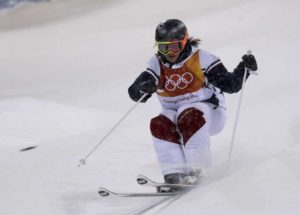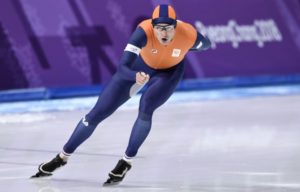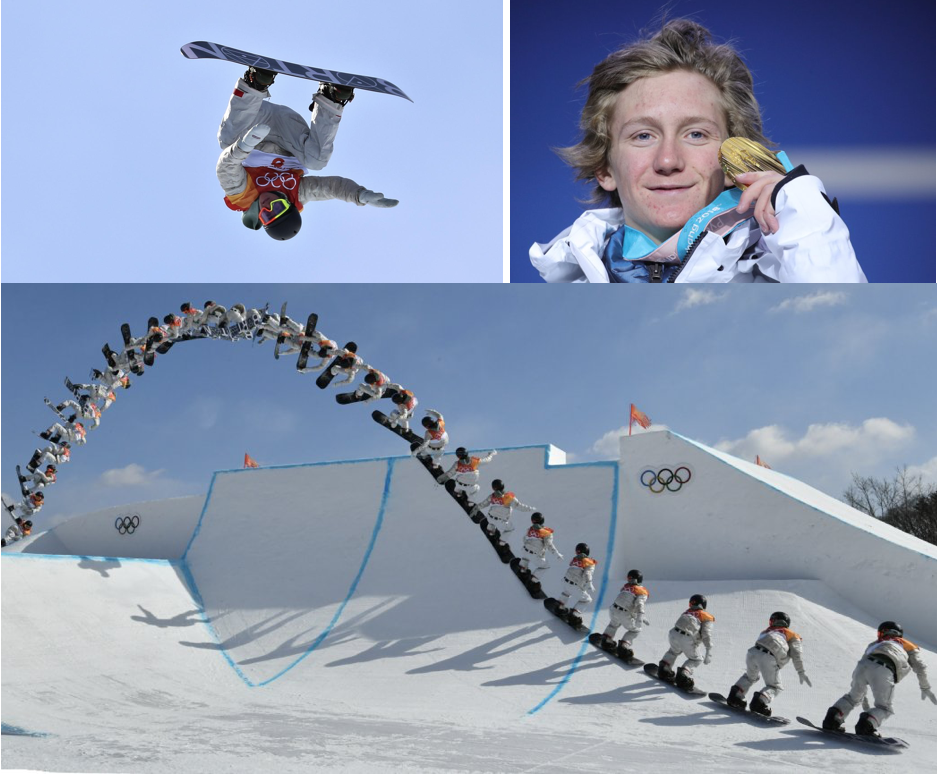Bad weather is forcing postponement of events at these Olympics in ways it used to force postponement of matches at Wimbledon. The Men’s Downhill and Women’s Giant Slalom are among the casualties. Except that no amount of preparation could insulate Alpine events from disorientating and dangerous wind gusts.
Men’s Snowboard Slopestyle
This event debuted four years ago in Sochi. But I can explain terms like jibs, backsides, fakies, and corks no better today than I could back then, despite watching many events.
Slopestyle is like performing trampoline-style acrobatics while going downhill on snowboards or skis. And this only gives a sense of the daring and skill involved in this sport. For example, Shaun White won gold when the death-defying Halfpipe debuted at the 2010 Vancouver Olympics. Yet he begged off competing in this event because it proved too taxing on his aging 31-year-old body.
That said, I was tremendously gratified when I pierced the inscrutable nature of Slopestyle scoring to predict the upset victory for one of the youngest competitors at these Games.
- Redmond Gerard of the United States won Gold; Max Parrot of Canada, silver; and Mark McMorris of Canada, bronze.
Gerard won the first gold of these Games for Team USA, emulating the feat Sage Kotsenburg performed when he won this same event in Sochi. This 17-year-old phenom also happens to be the first athlete born in this millennium (namely 2000) to win an Olympic Gold Medal. How old does that make you feel?!
Women’s Moguls
 Truth be told, I watched this event only to see how the three Dufour-Lapointe sisters of Canada would fare. This, because I was so impressed four years ago by their NBC profiles and even more so by their performances. Back then, youngest sister Justine and middle sister Chloe won gold and silver, respectively, but oldest sister Maxine finished a humbling 12th.
Truth be told, I watched this event only to see how the three Dufour-Lapointe sisters of Canada would fare. This, because I was so impressed four years ago by their NBC profiles and even more so by their performances. Back then, youngest sister Justine and middle sister Chloe won gold and silver, respectively, but oldest sister Maxine finished a humbling 12th.
As it happened, Justine was the only one who made it to the final round this time. But she was unable to defend her title.
- Perrine Laffont of France won gold; Justine Dufour-Lapointe of Canada, silver; and Yulia Galsheva of Kazakhstan, bronze.
Men’s 5000m Speedskating
One of the most thrilling and agonizing moments of the 2010 Vancouver Olympics was watching Sven Kramer, the “flying Dutchman,” win the 10,000m. Because, thanks to a truly bizarre disqualification, his thrill of victory soon turned to the agony of defeat. That he was not even at fault only compounded matters. Evidently, his coach directed him at some point to make an illegal lane crossover. He lost that race but won the hearts of millions everywhere.
 Even I cheered when he defended his title in the 5000m four years later in Sochi. I thought the form he displayed augured well for vindication in the 10,000m. Unfortunately, he fell short, managing only a relatively disappointing silver-medal performance.
Even I cheered when he defended his title in the 5000m four years later in Sochi. I thought the form he displayed augured well for vindication in the 10,000m. Unfortunately, he fell short, managing only a relatively disappointing silver-medal performance.
He is off to a similar start at these Games, completing a rare three-peat feat in this event yesterday. But it remains to be seen if he can finally vindicate that disqualification in Vancouver by winning the 10,000m. Having failed in 2014, I fear disappointment awaits again.
- Sven Kramer of the Netherlands won gold; Ted-Jan Bloemen of Canada, silver; and Sverre Lunde Pedersen of Norway, bronze.
Speedskaters Eric Heiden, Bonnie Blair, and Shani Davis are more famous on this side of the Atlantic. But this gold makes Kramer the most decorated speedskater in Olympic history. And, as indicated above, he’s bound to pad his record with more medals at these Games.
MEDAL COUNT: Norway 8, Netherlands 5, Germany 4
NOTE: Am I the only one who finds it laughable that the IOC banned Russia, yet Russians are figuring in media coverage almost as much as North Koreans…?
Related commentaries:
Day 1…
